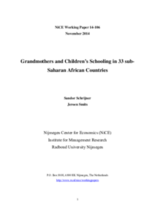This study examines the effect of the presence of a grandmother in the household on the child in 33 Sub-Saharan African countries. The study focuses on the effect the grandmother’s presence has on the child’s educational participation, considering a range of circumstances. The researchers used a newly built database as the source of information. The database included information on 763,615 young children living in 33 sub-Saharan African countries. The researchers conducted a multilevel logistic regression analysis on this database in an attempt to answer the following questions: (1) what is the overall relationship between grandmother’s co-residence and their grandchildren’s educational participation? and (2) to what extent and in which way is this relationship influenced by socio-economic, demographic and cultural characteristics at the household and context level?
Findings showed that the effect of a grandmother’s presence varies across circumstances, such as specific social, demographic and cultural factors at household and context level. However, the researchers concluded that the effect on the child is always positive. The study found that the presence of a grandmother is most effective in situations where there are greater opportunities, like being in a wealthier environment or being among an educated population. According to the study, this indicates that the presence of a grandmother helps households to make use of available opportunities in their environment, for the benefit of the children. These opportunities include a better education and transport infrastructure and a more solid tradition of going to school. Moreover, the study indicates that grandmothers are particularly important when the mother is missing and for girls.
Nijmegen Center for Economics (NiCE) Institute for Management Research, Radboud University Nijmegen

